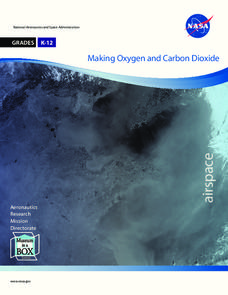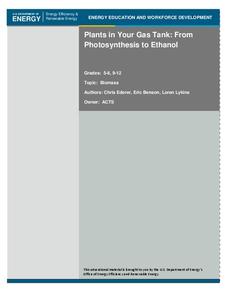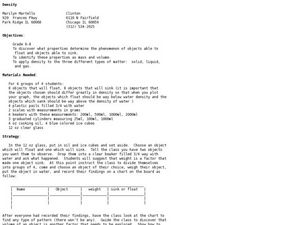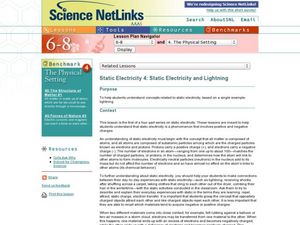NASA
Making Oxygen and Carbon Dioxide
Some like it hot! Scholars observe both exothermic and endothermic reactions as part of the carbon dioxide oxygen cycle. First, scientists demonstrate (or watch) a chemical reaction to create pure oxygen using fire for...
University of Colorado
Happy Landings: A Splash or a Splat?
Huygens spacecraft landed on Saturn's moon Titan in 2005, making it the farthest landing from Earth ever made by a spacecraft. In this hands-on activity, the 12th installment of 22, groups explore how density affects speed. To do this,...
National Nanotechnology Infrastructure Network
Nanotechnology Invention and Design: Phase Changes, Energy, and Crystals
What does it take to be considered a smart material? Learners investigate the properties of Nitinol, a smart material, through a hands-on lab activity. They examine the crystal lattice structure and the conditions required for Nitinol to...
University of Colorado
Modeling Sizes of Planets
The density of the huge planet of Saturn is 0.7 g/cm3, which means it could float in water! In the second part of 22, science pupils explore the size and order of the planets. They then calculate weight and/or gravity and density of...
PHET
Earth’s Magnetic Field from Space
Feel the pull of science! The final installment of this 18-part series is an application of everything learned in the previous high school lessons. Scholars are given a magnetic field map and must propose an arrangement of magnets that...
Messenger Education
Cooling with Sunshades
Messenger's sun shade measures 8 ft x 6 ft and will have temperatures reaching 700 degree Fahrenheit on the outside while maintaining a cool 70 degrees underneath. In the third activity of four, groups discuss the basic properties of...
Curated OER
Water Cycle Reading and Writing
Here is a great way to get pupils to express a scientific concept in a fun way. After hearing the story of Walter the Water drop and learning facts about the water cycle, the class will write a creative expository piece describing what...
American Chemical Society
The Discovery of Fullerenes
Carbon is the most common element on earth, so the innovative discovery of a new type of carbon molecule won the 1996 Nobel Prize. In the ready-to-go lesson, scholars learn about C60 and how it has opened up the entire area of...
Curated OER
Scientific Detectives
Middle schoolers examine the legitimacy of advertisers' claims about products using science and critical thinking. They view and discuss ads, read a case study, and conduct an experiment to demonstrate whether a product lives up to its...
Curated OER
Plants in Your Gas Tank: From Photosynthesis to Ethanol
Explore ethanol and how it is produced. Young scientists investigate photosynthesis and fermentation to the concept of conservation of energy and mass. They discuss the environmental and economical benefits of ethanol as a fuel additive.
Curated OER
Science: Liquid Matter
Second graders examine the properties of liquids and their classifications. They compare and contrast cups of different liquids and record their findings in journals. Students observe how liquids flow at various speeds and that unlike...
Curated OER
The Same But Different
Fourth graders identify the characteristics of a simple physical change. They describe objects by the properties of the materials from which they are made. Students discuss the different states of matter and their distinct physical...
Curated OER
The Penny Factory
Fourth graders identify the characteristics of a simple physical and chemical change. They describe objects by the properties of the materials from which they are made and separate or sort items using these properties. Students explain...
Curated OER
What a Can Can Do
Students explore properties of cans (including aluminum and steel) as they rotate through stations. They experiment with magnets, weight differences, resistance to corrosion and temperature conductivity.
Curated OER
Water & Ice
Learners investigate the properties of water. In this states of water lesson, students explore how water goes from liquid to solid and back to liquid again. Learners use measurement, observation, and communication to describe the change.
Curated OER
Critter? Growth
Students identify and use the elements of the scientific inquiry to solve problems. They explain concepts about the structure and properties of matter. Pupils write an explanation of polymers and how the characteristic of polymers...
Curated OER
Investigating Earth's Materials
First graders compare and contrast water from different sources. After collecting water from various sources, 1st graders create a list of observable properties of the water. Students then pour the water into a filter and observe the...
Curated OER
Frozen Solids
Students investigate various properties of ice including melting points and the effect of pressure on ice. They demonstrate how increased pressure lowers the melting point of ice and perform a simple experiment proving that water is more...
Curated OER
A Simple Viscosity Test
Fourth graders experiment with the viscosity of different liquids. They use a stopwatch to time the a steel ball as it drops through different liquids.
Curated OER
The Structure of Materials
Students brainstorm what matter is and how they define it. They construct a water molecule with marshmallows and toothpicks. In addition, they watch videos to explore the use the idea of nanoscience to investigate the properties of...
Curated OER
Density: Float or Sink
Pupils discover density. For this density lesson, students discover the properties of objects that allow them to float or sink in water.
Curated OER
Amazing Water Changes
Students explore the properties of water and how it changes states. In this kindergarten to 2nd grade science lesson, students pair a hands-on science activity with two suggested books. This inquiry lesson has...
Curated OER
Aeronautics: Bernoulli's Principle
Students explore physics by participating in a science activity in class. In this flight properties lesson, students identify Bernoulli's principle of flight and his theory of statics and motion. Students conduct a demonstration by...
Curated OER
Temperature and Enzymes
Students compare the times it takes the milk in each of two cups to curdle. They are told that an enzyme that is added to the milk, rennin, is involved in the natural curdling process of milk. Students are asked to consider what...























